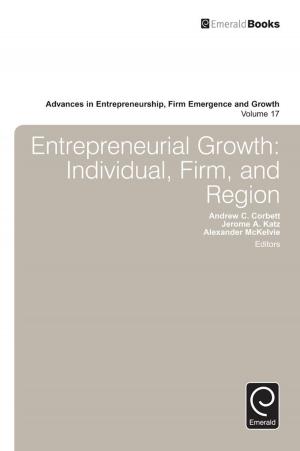Organizational Learning Approach to Process Innovations
The Extent and Scope of Diffusion and Adoption in Management Accounting Systems
Business & Finance, Accounting, Management| Author: | Marc J. Epstein | ISBN: | 9781780527352 |
| Publisher: | Emerald Group Publishing Limited | Publication: | April 4, 2012 |
| Imprint: | Emerald Group Publishing Limited | Language: | English |
| Author: | Marc J. Epstein |
| ISBN: | 9781780527352 |
| Publisher: | Emerald Group Publishing Limited |
| Publication: | April 4, 2012 |
| Imprint: | Emerald Group Publishing Limited |
| Language: | English |
In times of economic turbulence, an organization's ability to learn from its environment and adopt innovations enhances its competitive advantage as well its ability to improve its performance. This book focuses specifically on the contribution learning and innovation in management accounting can contribute to the success of the organization. However, all management accounting innovations may not be successful. The success of an innovation is contingent upon whether the learning and implementation processes have been properly integrated. When they are not, an innovation that has been successful in one organization may fail in another. An integrative framework is developed for studying management accounting process innovations. The framework draws on theories from organizational sociology. It focuses on the impact of the innovation on the organization along two important dimensions. First, to what degree does the innovation alter the organization's management accounting system (labeled as extent)? Second, what portion of the organization is affected by the change (labeled as scope)? We classified these dimensions on a continuum ranging from high or low. This yields a 2x2 contingency framework. The book examines each of the resulting four situations using both Argyris's typology of single and double loop learning as well as the variety of theories used to explain the adoption, or failure to adopt, a particular innovation, e.g., Rogers, Sandberg, in an organization. Recent management accounting innovations such as Activity Based Costing (ABC) and Balanced Scorecard (BSC) are used to illustrate the concepts and examples drawn from organizational practices. ABC and BSC are used as examples of management accounting innovations to illustrate why they are more successful in some organizations but not in others.
In times of economic turbulence, an organization's ability to learn from its environment and adopt innovations enhances its competitive advantage as well its ability to improve its performance. This book focuses specifically on the contribution learning and innovation in management accounting can contribute to the success of the organization. However, all management accounting innovations may not be successful. The success of an innovation is contingent upon whether the learning and implementation processes have been properly integrated. When they are not, an innovation that has been successful in one organization may fail in another. An integrative framework is developed for studying management accounting process innovations. The framework draws on theories from organizational sociology. It focuses on the impact of the innovation on the organization along two important dimensions. First, to what degree does the innovation alter the organization's management accounting system (labeled as extent)? Second, what portion of the organization is affected by the change (labeled as scope)? We classified these dimensions on a continuum ranging from high or low. This yields a 2x2 contingency framework. The book examines each of the resulting four situations using both Argyris's typology of single and double loop learning as well as the variety of theories used to explain the adoption, or failure to adopt, a particular innovation, e.g., Rogers, Sandberg, in an organization. Recent management accounting innovations such as Activity Based Costing (ABC) and Balanced Scorecard (BSC) are used to illustrate the concepts and examples drawn from organizational practices. ABC and BSC are used as examples of management accounting innovations to illustrate why they are more successful in some organizations but not in others.















